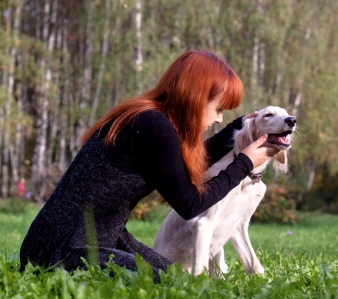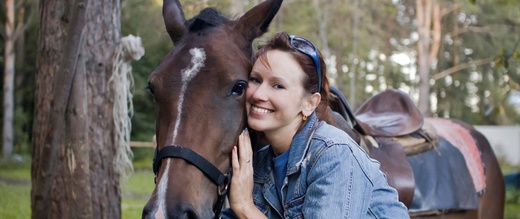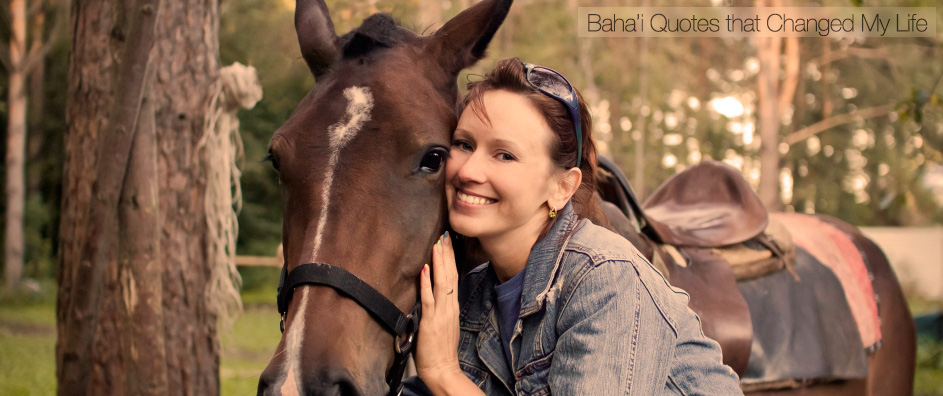The views expressed in our content reflect individual perspectives and do not represent the official views of the Baha'i Faith.
That seeker… should show kindness to animals, how much more unto his fellow-man, to him who is endowed with the power of utterance. … He should not wish for others that which he doth not wish for himself, nor promise that which he doth not fulfil. — Baha’u’llah, The Kitab-i-Iqan, pp. 194–195.
This epigraph comes from a passage popularly known as the “Tablet of the True Seeker” in Baha’u’llah’s The Kitab-i-Iqan: The Book of Certitude, revealed in two days and two nights in January 1861. Since it comes from the Book of Certitude, we know that the Baha’i ethic of kindness to animals is an integral part of Baha’i precept and practice.
Baha’u’llah presents kindness to animals as a precondition to spiritual enlightenment.
Baha’u’llah’s exhortation to “show kindness to animals” is followed by the Golden Rule, as if to say, if I may so paraphrase: “He should not wish for others [animals, as well as persons] that which he doth not wish for himself.” I may be taking some liberty with this text by including the treatment of animals in the Golden Rule. But we are, after all, part animal. Kindness to animals is therefore one of the basic Baha’i principles.
We can gain wisdom from showing kindness to animals, just as we can do good. This is my personal meditation on kindness to animals, which will involve a very short story that was published in 1976, in an issue of a student magazine that won a Mark of Excellence Award by Society of Professional Journalists in Seattle.
I became a Baha’i on December 15, 1972, a little over 40 years ago. At that time, when I discovered the Baha’i Faith, everything was new to me. It felt like a discovery each time I learned something new about the Baha’i teachings and their prescriptions for a better life, both material and spiritual. Prior to becoming a Baha’i, I had never before thought very much about animals. They were just there. Of course, I was not the kind of person who would deliberately inflict pain on any animal. But I didn’t go out of my way to be kind to them, either.
Yet the Baha’i principle of kindness to animals sensitized me. It expanded my consciousness and deepened my soul. My thinking about animals underwent a transformation, as I progressed from apathy to empathy. Although the Baha’i teachings teach that animals do not have souls, they do possess feelings. For me, this Baha’i principle endowed animals with a kind of “primitive soul” which the Baha’i Writings refer to as the “animal spirit.” For me, spirituality includes animals.
By virtue of this Baha’i insight, animals suddenly became more real to me, more alive, more immediate, more infused with feeling. I resolved that my treatment of animals would be a benchmark of my spiritual development, of my capacity for empathy, of my ability to see the consequences of my own actions, whether to a person or to an animal.
 Strange to say, but the Baha’i principle of kindness to animals expanded my moral universe. I started thinking about animals. What is it like to be an animal? What does it feel like to be an animal in pain? Does the animal say to itself, “I am hurting. I am in great pain”? Maybe not, especially if the animal has no consciousness of itself as an individual. We might have to subtract the abstract, self-reflective “I” typically associated with the self-conscious soul.
Strange to say, but the Baha’i principle of kindness to animals expanded my moral universe. I started thinking about animals. What is it like to be an animal? What does it feel like to be an animal in pain? Does the animal say to itself, “I am hurting. I am in great pain”? Maybe not, especially if the animal has no consciousness of itself as an individual. We might have to subtract the abstract, self-reflective “I” typically associated with the self-conscious soul.
So does the animal think to itself, “This hurts. This is very painful”? Still too abstract, I concluded. So I subtracted the “This” from my meditation.
Probably the animal experiences pain in a primal way. If it could speak, the animal would say: “Hurt. Pain.”
And then, I thought, perhaps the animal, since it cannot conceptualize the abstract or give utterance in words, simply experiences pain — raw, primal, unmitigated pain.
Because the pain is so raw, there is every likelihood that it is experienced more intensely. I do not know. But I do know the Baha’i principle. I know that it is good. I know that to do good helps me to see the truth, because the truth is to do good.
The next article in the series: A Mouse in My Spiritual House
©2013 by Christopher Buck.


















Comments
Sign in or create an account
Continue with Facebookor